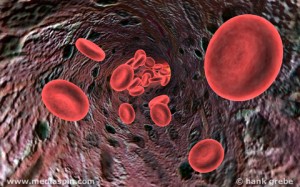Part I of Brain Fog: 20 Causes and symptoms covered reasons some people get brain fog, and the many ways brain fog interferes with daily activities. Part II of Brain Fog covers ways to deal with chronic forgetfulness, fatigue, and disorientation that make up brain fog from B12 deficiency, fibromyalgia, or other illnesses.
How to deal with brain fog
Obviously, the most important thing to do in dealing with brain fog is to treat whatever’s causing it. If you think you have vitamin B12 deficiency, then get a blood screening. You could have pernicious anemia resulting from low B12 (cobalamin) levels, or fibromyalgia, which is correlated with vitamin B12 deficiency. In that case, the simple answer is to supplement with extra vitamin B12.
Here are some excellent lifestyle tips for getting around brain fog:
- Take your vitamins and minerals. Besides getting enough vitamin B12, you should also be getting enough of all the other B vitamins, in addition to vitamin C, vitamin E, vitamin D, magnesium, and calcium.
- Sleep. Avoid naps, but stay regimented in your nighttime habits.
- Treat your pain symptoms. This one’s a no-brainer. The fact is, pain distracts you, even when you don’t realize it. If you suffer migraines, and your current migraine treatment isn’t working, then explore other options. The same goes for chronic pain like fibromyalgia- never give up on lasting pain relief!
- Exercise! This is difficult when you have chronic pain, but even small efforts at maintaining a fitness plan can be therapeutic. Try to incorporate stretching into your morning routine, or take small walks. Tai chi and yoga are particularly helpful for people with fibromyalgia.
- Try an elimination diet. You never know- your brain fog could be a result of allergic reactions like gluten intolerance or milk allergy.
- Eat brain food. Some foods that are high in omega-3 fatty acids, like fish and nuts. Stick to lean proteins and plenty of fruits and veggies.
- Check your blood sugar. Brain fog is a common symptom of diabetes, so make certain that you’re not getting type 2 diabetes.
- Limit caffeine. The rush you get from drinking strong coffee is only temporary. It is always followed by fatigue, or for some, brain fog.
- Avoid processed foods. There is a substantial body of evidence indicating that cutting out white flour, white sugar, processed snack foods, and stripped grains (white rice) from your diet prevents chronic fatigue and brain fog, in addition to promoting healthy weight loss.
- Try alternative medicine. Holistic and homeopathic medicine is becoming more mainstream as an alternative to some prescribed medications in treating chronic illness symptoms like pain and brain fog. Some good ones to try include acupuncture/acupressure, herbal supplements, and biofeedback.
- Look into cognitive training. Researchers are finding that exercising your thinking skills is an effective way to reverse cognitive dysfunction, or brain fog. Examples of cognitive training are video games, websites, or programs like Wii that promise to improve your memory, regain mental clarity, and think quicker.
- Think ahead. Sometimes, it helps to be prepared in life’s situations, especially if you have brain fog on a daily basis. Always think out a scenario in your head beforehand, and imagine ways you might make things easier on yourself. If you’re worried about going on a job interview, look up tips for landing a job and creating a good impression.
- Rehearse what you’re going to say. Back to the job interview- go over the basic questions that people ask you when you’re interviewing for a position, and decide what you’re going to answer, ahead of time. This way, you won’t be put on the spot when your future-boss asks you what traits you like the least about yourself. (Hint: There is no real answer to this one.)
- Take it slow. Don’t try to cook a dinner for five in five minutes. Even if it means running late, pace yourself. People with brain fog are more susceptible to serious injury when they try to do things in a hurry, so give yourself extra time to do things.
- Stay organized. This is the secret to success with brain fog. If you have one place where you always keep your scissors, then you won’t waste valuable time searching all over your house every time you need to open a package or cut the tags off a new outfit.
- Keep a good perspective. A good sense of humor can get you through chronic pain, brain fog, anxiety…anything. In fact, some studies have been done which show that chronic illness sufferers who try to achieve happiness and look for the “sunny side” in life are more successful at eventually conquering their symptoms and healing their pain than those for whom the glass is always half-empty.
- Don’t be afraid to ask for help. It’s okay to admit that you don’t understand something- even if it’s been explained to you three times already. Don’t pretend to “get it” when you don’t. The results can be social awkwardness, feelings of isolation, and worse- injury. (Know how the electric meat cutter works before you lose a finger!)
- Tools are helpful, so use them. If you have a smartphone, iPad, or other tablet device, then make it work for you. You don’t have to remember phone numbers, dates, directions, shopping lists, passwords, or birthdays. That’s what your Android is for!
- Relax. Another no-brainer: learning how to relax is instrumental in relieving stress, which is a common cause of brain fog.
- Seek counseling. If things seem too overwhelming, and you don’t know what to do about it, talk it out with a professional. Everybody who visits a shrink every now and then isn’t mentally ill…just human.
Please tell us…
Do you have anything to add to this article? We would love to know! Please comment below, and share this with your friends.
Read more about vitamin B12 and your brain:
Brain Fog: 20 Causes and symptoms
Here’s Your Brain on B12 Deficiency- Memory Loss and Aging
How to keep Vitamin B12 Deficiency from Shrinking your Brain
Tired of being Tired all the Time…It’s Tiring!
7 Reasons You Have Brain Fog…And What to do About It
Sources:
Brain Fog/Fibro Fog in Fibromyalgia & Chronic Fatigue Syndrome
Migraine and Brain Fog Tips and Tricks































